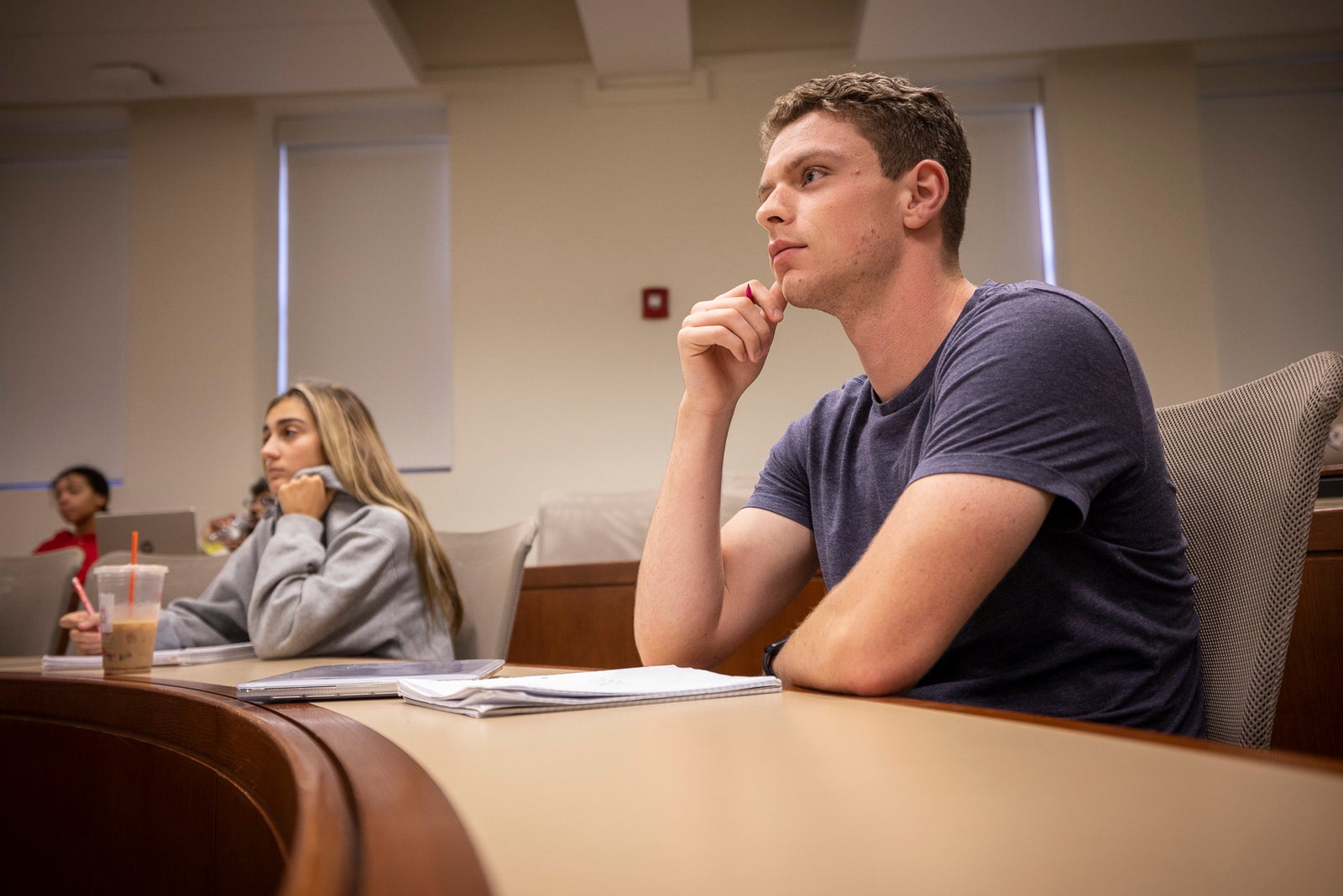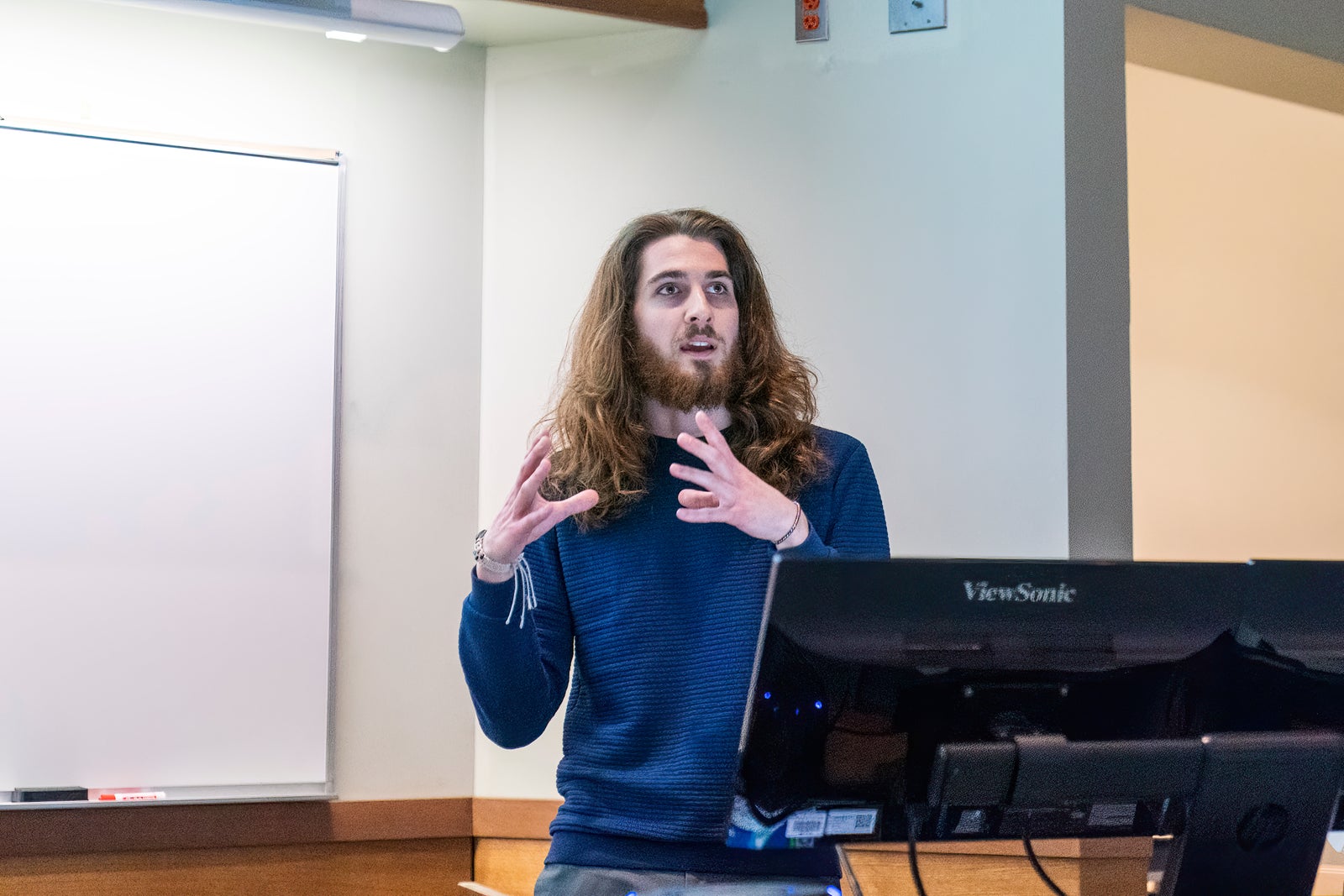Study Mental Health in Boston’s Healthcare and Human Services Hub
The counseling & health psychology concentration explores the causes, treatment, and prevention of mental health conditions across the lifespan. You’ll study psychological theory alongside applied clinical skills, developing an understanding of diagnostic tools, therapeutic methods and the connections between mental health, stress and physical wellness.
Through courses in psychopathology, counseling theory and health psychology, students build a strong foundation for careers in mental health and human services. Faculty-mentored research, real-world case studies, and experiential learning help you develop the empathy, communication skills and critical thinking needed in client-facing roles.
Located near Boston’s top hospitals and human service organizations, Emmanuel connects you to meaningful internship opportunities and professional networks. The concentration prepares students for graduate study and careers in counseling, public health, clinical psychology and social work.
Outcomes & Outlook
100%
96%
#2
$105K
A First-Class Experience
Get to know the people and programs that will define your academic journey.

Maritza Nassif ’17, G’18 Leads with Empathy at Dana-Farber
The Counseling & Health Psychology alum began as a Dana-Farber volunteer while at Emmanuel. Now she leads the institute’s volunteer services, shaping patient-centered programs that reflect the same values she first explored as a student.

Meet the Faculty
Our distinguished faculty publish, exhibit and research. Present, compose and chair. Inspire and collaborate.
The Curriculum
View the 2024-2025 Academic Catalog to find course titles, numbers and descriptions.
Requirements for a B.A. in Psychology with Concentration in Counseling & Health Psychology
Core Requirements:
- PSYCH1501 General Psychology (SA) (SS)
- PSYCH2209 Physiological Bases of Behavior (SI) (NS) or NEURO2201 Neurobiology with Lab (NSL)
- PSYCH2801 Methods and Statistics I (WI)
- PSYCH2802 Methods and Statistics II (QA) (QR)
- PSYCH3111 Cognition
Requirements for Concentration:
- PSY2405 Health Psychology
- PSYCH3210 Child Psychopathology or PSYCH3212 Adult Psychopathology
- PSYCH3601 Counseling Theories and Techniques
- PSYCH4282/PSYCH4283 Research Internship I and II or PSYCH4494/PSYCH4495 Applied Internship I and II
At least one elective from the following:
- PHIL3109 Philosophy of Mind
- PHIL3110 Philosophy of Psychiatry
- PSYCH2203 Social Psychology (SA) (SS)
- PSYCH2210 Personality Psychology
- PSYCH2211 Race, Gender and Sexuality: Intersection of Privilege and Oppression (SA) (SS) (DM)
- PSYCH2303 Child Psychology (SA) (SS)
- PSYCH2304 Adulthood and Aging
- PSYCH2403 Adolescent Development (SA) (SS)
- PSYCH2410 The Psychology of Happiness and Well-being
- PSYCH3101 Seminar: Psychology of Women
- PSYCH3103 Relationships, Marriage and the Family (SA)
- PSYCH3201 Psychology of Language
- PSYCH3404 Emerging and Established
The psychology and neuroscience department’s Learning Goals are based on the recommendations of the American Psychological Association and consist of:
- Knowledge and Critical Engagement in Psychology: Students will understand and can apply the major concepts, theoretical perspectives (biological, behavioral, cognitive, developmental, and social), empirical findings, and historical trends in psychology, as well as the APA Code of Ethics.
- Research Methods in Psychology: Students will be able to engage in research design, sampling, data collection, data analysis and interpretation.
- Information and Technological Literacy: Students will be proficient in the use of information and technology for many purposes relevant to the field of Psychology.
- Communication Skills: Students will be proficient in written and oral communication in a variety of formats for educational and professional purposes.
- Personal and Professional Development: Students will understand the links between personal and professional values, knowledge and skills, and academic and career goals.
What can I do with a degree in counseling and health psychology?
Counseling and health psychology majors have a diverse range of career opportunities available to them in various settings, including mental health clinics, hospitals, schools, private practices, and corporate environments. Here are some potential jobs and career paths for individuals with a degree in counseling and health psychology:
Clinical and Counseling Professions
- Clinical Psychologist: Diagnose and treat mental health disorders through therapy and interventions. Requires a doctoral degree (Ph.D. or Psy.D.) and licensure.
- Licensed Professional Counselor (LPC): Provide counseling services to individuals, couples, and families. Requires a master’s degree in counseling and licensure.
- Marriage and Family Therapist (MFT): Focus on family dynamics and relationship issues. Requires a master’s degree in marriage and family therapy and licensure.
- School Counselor: Support students’ academic, career, and emotional development within educational settings. Requires a master’s degree in school counseling and certification.
Health Psychology and Behavioral Medicine
- Health Psychologist: Work with patients to manage chronic illnesses, promote healthy behaviors, and improve overall well-being. Often requires a doctoral degree.
- Behavioral Health Specialist: Provide interventions to help patients manage stress, quit smoking, lose weight, and adopt healthier lifestyles.
- Rehabilitation Psychologist: Work with individuals recovering from injuries or dealing with disabilities to improve their quality of life.
Addiction and Substance Abuse Counseling
- Substance Abuse Counselor: Help individuals struggling with addiction to drugs, alcohol, or other substances through therapy and support programs. Requires certification or licensure, which varies by state.
- Recovery Coach: Provide ongoing support and guidance to individuals in recovery from substance abuse.
Social Services and Community Health
- Social Worker: Provide support and resources to individuals and families facing various life challenges. Requires a Master of Social Work (MSW) degree and licensure.
- Community Health Worker: Educate and support community members to improve health outcomes and access to healthcare services.
Educational Settings
- School Psychologist: Assess and support the mental health and learning needs of students within schools. Requires a specialist degree (Ed.S.) or doctoral degree.
- Educational Counselor: Provide academic and career counseling to students in high schools and colleges.
Corporate and Organizational Roles
- Employee Assistance Program (EAP) Counselor: Provide counseling and support services to employees within a corporate setting, helping them manage personal and work-related issues.
- Corporate Wellness Coordinator: Develop and implement wellness programs to promote the health and well-being of employees.
Research and Academia
- Academic Researcher: Conduct research on mental health, behavioral health, and counseling interventions. Typically requires a doctoral degree.
- University Professor: Teach courses in psychology, counseling, or health psychology and conduct research. Requires a Ph.D. or Psy.D.
Public Health
- Public Health Advisor: Work with government agencies or non-profits to develop and implement public health initiatives and policies.
- Health Educator: Create and deliver programs to educate communities about mental health, wellness, and preventive care.
Gerontology
- Gerontological Counselor: Specialize in the mental health needs of older adults, addressing issues such as aging, dementia, and caregiving.
These career paths leverage the strong foundation in psychological principles, counseling techniques, and health promotion that counseling and health psychology majors possess. Graduates are well-prepared to make significant contributions to mental health, wellness, and overall quality of life across various populations and settings.
Where Essential Values and Skills Meet the Real World
Along with areas of knowledge and major requirements, you will cultivate essential values in the classroom and complete two courses in each area:
- Social Justice (SJ): Develop knowledge, skills, values and motivation to participate beneficially in activities of personal and public concern.
- Diversity & Multiculturalism (DM): Understand the complexity of identity the historical truths of different cultural perspectives to address bias and examine contemporary social issues.

One hundred percent of Emmanuel students complete an internship as part of the core curriculum. In a city as dynamic as Boston, your options are bound only by the limits of your curiosity.
Psychology and Neuroscience majors put their classroom- and lab-based learning into practice completing original research alongside faculty or with internships at nearby institutions such as Boston Children’s Hospital, Brigham & Women’s Hospital, Massachusetts General Hospital, McLean Hospital, the Broad Institute, Bay Cove Human Services and more.

In all majors, the Capstone Experience involves completing a significant piece of work that requires the integration and application of learning from multiple courses.
All Psychology majors complete a two-semester capstone experience during senior year, choosing either an applied internship that engages in clinical and professional work at any number of institutions or a research experience that engages in empirical research or an independent study. Either experience sets Emmanuel graduates apart when seeking employment or graduate school admission post-graduation.

Science & Health Spotlight
See more news and stories related to the School of Science & Health


